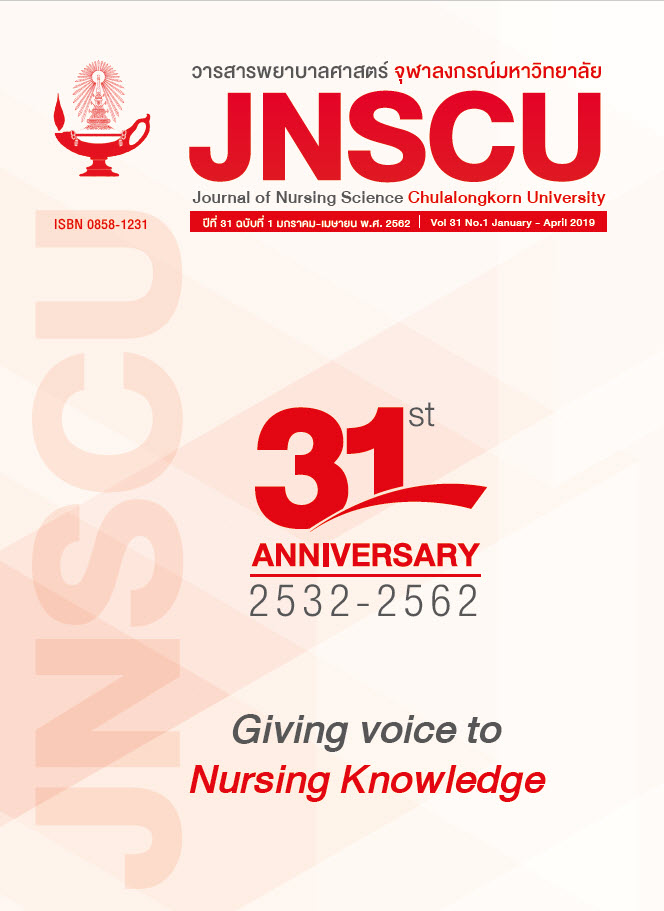ปัจจจัยที่มีผลต่อการเลี้ยงลูกด้วยนมแม่อย่างเดียว 4-6 สัปดาห์ หลังคลอด ในมารดาที่มีภาวะน้ำหนักเกินและอ้วนก่อนตั้งครรภ
คำสำคัญ:
การเลี้ยงลูกด้วยนมแม่อย่างเดียว 4-6 สัปดาห์, มารดาหลังคลอด, ภาวะน้ำหนักเกินและอ้วนก่อนตั้งครรภ์บทคัดย่อ
วัตถุประสงค์: เพื่อศึกษาอัตราการเลี้ยงลูกด้วยนมแม่อย่างเดียว และปัจจัยที่มีผลต่อการเลี้ยงลูกด้วยนมแม่
อย่างเดียว 4-6 สัปดาห์หลังคลอด ในมารดาที่มีภาวะน้ำหนักเกินและอ้วนก่อนตั้งครรภ์
แบบแผนการวิจัย: การวิจัยแบบบรรยายเชิงทำนาย (Descriptive predictive research)
วิธีดำเนินการวิจัย: กลุ่มตัวอย่างคือ มารดาหลังคลอด 4-6 สัปดาห์ ที่มีภาวะน้ำหนักเกินและอ้วนก่อนตั้งครรภ์
จำนวน 200 ราย ที่มารับบริการตรวจสุขภาพภายหลังคลอดบุตร ที่แผนกผู้ป่วยนอกสูติ-นรีเวชกรรม
โรงพยาบาลสายใยรักแห่งครอบครัว จังหวัดชลบุรี จำนวน 3 แห่ง ได้แก่ โรงพยาบาลชลบุรี โรงพยาบาล
สมเด็จพระบรมราชเทวี ณ ศรีราชา และโรงพยาบาลบางละมุง คัดเลือกกลุ่มตัวอย่างตามความสะดวก
เครื่องมือวิจัยประกอบด้วย แบบสอบถามข้อมูลส่วนบุคคล แบบสอบถามข้อมูลการเลี้ยงลูกด้วยนมแม่
แบบสอบถามการรับรู้ประโยชน์ของการเลี้ยงลูกด้วยนมแม่ แบบสอบถามการรับรู้อุปสรรคต่อการเลี้ยงลูก
ด้วยนมแม่ แบบสอบถามการรับรู้ความสามารถของตนเองในการเลี้ยงลูกด้วยนมแม่ และแบบสอบถาม
การสนับสนุนการเลี้ยงลูกด้วยนมแม่ วิเคราะห์ข้อมูลด้วยสถิติเชิงพรรณนา และการวิเคราะห์ถดถอย
โลจิสติกทวิ
ผลการวิจัย: มารดาภายหลังคลอดที่มีภาวะน้ำหนักเกินและอ้วนก่อนตั้งครรภ์มีอัตราการเลี้ยงลูกด้วยนมแม่
อย่างเดียว 4-6 สัปดาห์ คิดเป็นร้อยละ 45 ปัจจัยด้านการรับรู้ประโยชน์ของการเลี้ยงลูกด้วยนมแม่ การรับรู้
อุปสรรคต่อการเลี้ยงลูกด้วยนมแม่ การรับรู้ความสามารถของตนเองในการเลี้ยงลูกด้วยนมแม่ และการสนับสนุน
การเลี้ยงลูกด้วยนมแม่ ร่วมกันทำนายการเลี้ยงลูกด้วยนมแม่อย่างเดียว 4-6 สัปดาห์ ได้ร้อยละ 28.3
(Nagelkerke R2
= .283, p < .05)
สรุป: พยาบาลควรนำปัจจัยที่มีผลต่อการเลี้ยงลูกด้วยนมแม่อย่างเดียว 4-6 สัปดาห์ภายหลังคลอด มาใช้
ในการส่งเสริมการเลี้ยงลูกด้วยนมแม่อย่างเดียวในมารดาที่มีภาวะน้ำหนักเกินและอ้วนก่อนตั้งครรภ์
คำสำคัญ: การเลี้ยงลูกด้วยนมแม่อย่างเดียว 4-6 สัปดาห์/ มารดาหลังคลอด/ ภาวะน้ำหนักเกินและอ้วน
ก่อนตั้งครรภ
เอกสารอ้างอิง
World Health Organization. World health statistics 2018: monitoring health for the SDGs, sustainable developmentgoals. Geneva: WHO; 2018.
Aekplakorn W, editor. Thai national health examinationsurvey, NHESV. Nonthaburi:HealthSystemsResearchInstitute;2014.(In Thai)
WojcickiJM.Maternal prepregnancy bodymass index and initiation and duration of breastfeeding:areview of theliterature. J Womens Health 2011;20(3):34-47.
Tannirandorn Y, Phupong V, Kovavisarach E. Maternal-fetalmedicine.3rd ed.Bangkok:
TheRoyalThai Collegeof Obstetricians and Gynaecologists; 2012. (In Thai)
Babendure JB, Reifsnider E, Mendias E, Moramarco M W, Davila YR. Reduced breastfeedingratesamongobesemothers: areview ofcontributing factors,clinical considerationsand future directions. Int Breastfeed J 2015;10(1):1-11.
Nommsen-RiversLA, Chantry CJ,PeersonJM, CohenRJ, DeweyKG. Delayed onsetof lactogenesis among first-time mothers is related to maternal obesity and factors associated with ineffective breastfeeding. Am J Clin Nutr 2010; 92(3):574-84.
Winkvist A, Brantsæter AL, Brandhagen M, Haugen M, Meltzer HM, Lissner L. Maternal prepregnant body mass index and gestational weight gain areassociated with initiation and duration of breastfeeding among Norwegian mothers. J Nutr 2015;145(6):1263-70.
Guelinckx I, Devlieger R, Bogaerts A, Pauwels S,Vansant G.Theeffectof pre-pregnancy BMIonintention, initiationand duration of breast-feeding. Public Health Nutr 2012;15(5):840-48.
Boudet-Berquier J,SalanaveB, Desenclos JC, Castetbon K. Association between maternal prepregnancy obesity and breastfeeding duration: data from a nationwide prospective birth cohort. Matern Child Nut 2017;14(2):1-12.
Pender NJ,Murdaugh CL,Parsons MA. Health promotion in nursing practice. 7th ed. New Jersey: Pearson Education; 2015.
Phonhusol C, Sangin S, Suppasri P. Factors affecting breastfeeding behavioramong postpartum mothers in privatehospital Chonburi province. Chonburi Hospital Journal 2016;41(1):31-8. (In Thai)
Piejko E. The postpartum visit: why wait 6 weeks?. Aust Fam Physician 2006; 35(9):674-78.
PeduzziP, ConcatoJ,KemperE, Holford TR, Feinstein AR. A simulationstudyof the numberofevents pervariableinlogistic regressionanalysis. ClinEpidemiol1996; 49(12):1373-9.
Tumchuae S, Kulnarid W. The study of comparison of perceived-benefits,perceived-barriers,exclusivebreastfeeding behavior betweenthe primigravidaand multipara postpartuminSaraburihospital.
Saraburi: Boromarajjonani College of Nursing, Saraburi; 2006. (In Thai)
Dennis CL. The breastfeeding self-efficacy scale: psychometric assessmentof the shot from. J Obstet Gynecol NeonatalNurs 2003;31(1):12-32.



